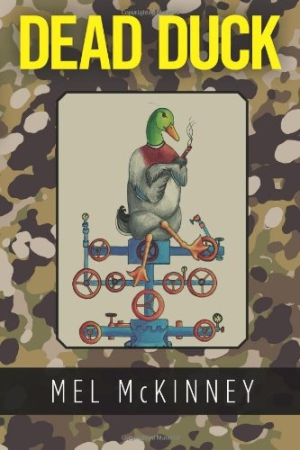Dead Duck
McKinney knows his subject matter—both the law and duck hunting—and brings his characters and setting to life with humor.
Dead Duck is set among the duck hunting clubs of the Butte Sink in Northern California. Mel McKinney is undeniably familiar with the subject matter, settings, and characters he has chosen for this mystery, making for a truly enjoyable novel.
Drake Green is a Vietnam vet who returned home in 1976 to Waterloo, the land his family had owned for generations. A mysterious fire had burned down the original lodge decades earlier, killing his father. Once home, Green decided not to return Waterloo to its original splendor. Instead, by 2003, he created a modest hunting club suited to serious sportsmen. His neighbor, Armand Styles Stilton III, however, is an obnoxious bully who will stop at nothing to obtain Green’s land so that he and some Texas investors can run gas pipelines through it. In his attempt to stop Stilton, Green finds unexpected allies in his Native American girlfriend and her family.
McKinney is a lifelong outdoorsman and a retired trial attorney with three decades of experience. He has the chops to poke subtle fun at numerous targets. First, he applies the Federal Clean Water Act to create plausible legal shenanigans. He also demonstrates a solid understanding of how judges and lawyers are perceived in a small community. For example, the local sheriff delays enforcing an arrest warrant issued by “that damn fool lady judge” from Santa Clara County after Green grants the sheriff’s indirect request for some duck hunting and a rib-eye steak. Additionally, McKinney accurately portrays the difference between true sportsmen like Green and wealthy playboys like Stilton, for whom hunting is an excuse to drink and gamble, buy useless gadgets, shoot at anything that flies, and blame everyone else when they miss.
Dead Duck is a well-crafted story. McKinney knows the real-life terrain about which he writes and relies on the land’s contours to bring the plot to life. He also plants details early in the narrative that come together to bring the novel to a realistic conclusion, but he does it with such care that the ending remains unclear until revealed. At the same time, he keeps the pace moving, with the entire story occurring in just a little over two months.
McKinney’s characters are also well defined. Green is mostly unflappable, loyal to his family’s legacy, and prone to letting things work themselves out. Stilton has no redeeming qualities and is reviled equally by almost everyone, including his employees, club members, and current wife. The one exception is Stilton’s newest lawyer, Jackson Crackers, who is ruthless, greedy, and completely without ethics.
The cover design of Dead Duck deserves mention as well. A duck, smoking a cigar while sitting cross-legged on a gas well, on a background of camouflage, perfectly suits the book’s humor.
Dead Duck is amusing and entertaining. McKinney writes from his strengths to his advantage. This novel should not be missed, especially by those with knowledge of the law or duck hunting.
Reviewed by
Annie Peters
Disclosure: This article is not an endorsement, but a review. The publisher of this book provided free copies of the book and paid a small fee to have their book reviewed by a professional reviewer. Foreword Reviews and Clarion Reviews make no guarantee that the publisher will receive a positive review. Foreword Magazine, Inc. is disclosing this in accordance with the Federal Trade Commission’s 16 CFR, Part 255.

